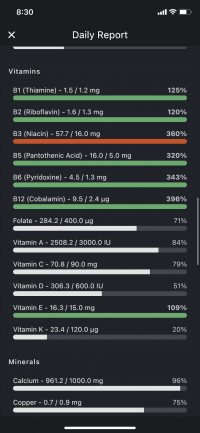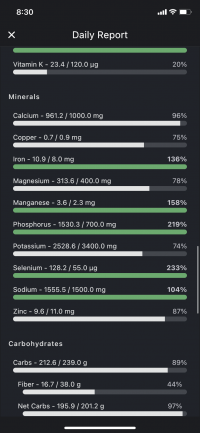Napolitano
New Member
- Joined
- Sep 21, 2019
- Messages
- 3
Here's the results of my recent bloodwork:
Biochemical:
Fasting glycemia: 89 mg/100ml. Range: 70 - 115
Vitamin D (25-OH): 20.2 ng/ml. Range: 30-1 - 100
Vitamin D (1,25): 27 pg/ml. Range: 25 - 66 (in range but low)
Quantiative albumin: 4.2 g/100ml. Range: 3.80 - 5.10
Hormones:
IGF-1: 149 ng/ml. Range: 100.00 - 591.00
Estradiol (E2): 39 pgr/ml. Range in men: < 55
FSH: 2.36 mUI/ml. Range in men: 1 - 12
LH: 3.2 mUI/ml. Range in men: 1 - 7
Prolactin: 40.1 ngr/ml. Range: 2.50 - 16
Progesterone: <0.2 ng/ml. Range in men: 0.1 - 0.6
Total Tetosterone: 4.9 ng/ml. Range in men: 1.60 - 8.50
Free Testosterone: 11.2 pg/ml. Range: 6.60 - 42.50
DHT: 0.27. Range: 0.25 - 0.99
Dehidropiandrosterone: 13.9 ng/ml. Range: 1.40 - 13.50
Delta 4-Androstendione: 5.16 ng/ml. Range: 0.4 - 3.7
SHBG: 28.7 nmol/L. Range: 10.00 - 57.00
ACTH: 68.3 pgr/ml. Range: 7.00 - 63
Fasting cortisol (morning): 301.4 ng/ml. Range: 70.00 - 250
G.H: 1.97 mcg/l. Range: 0.00 - 5.00
Fasting insulin: 5.4 mcUI/ml. Range: 6 - 25
Fractionated Catecholamines:
Adrenalin: 49 pgr/ml. Range: 20 - 85
Noradrenalin: 434 pgr/ml. Range 0 - 420
Dopamin: 25 pgr/ml. Range 10 - 94
3α-Androstanediol glucuronide 7.1 ng/ml. Range: 3.50 - 22
IGFBP-3: (Insuling growing factor binding): 3.35 mcg/ml. Range: 0.9 - 4.7
Thyroids section:
PTH-i: 50.2 pgr/ml. Range: 18.5 - 88
Thyroglobulin: <1 ng/ml. Range: 1.9 - 59.9
Total T3: 1.02 ng/ml. Range: 0.65 - 1.6
Free T3: 6.1 pmol/L. Range 4 - 8.30
Reverse T3: 0.15 ng/ml. Range: 0.10 - 0.35
Total T4: 6.6 mcg/100ml. Range: 4.70 - 9.70
Free T4: 10.2 pg/ml. Range: 9 - 19.50
TSH: 4.17. mcUI/ml. Range: 0.25 - 5
Inmunology:
Antibodies anti-receptor of TSH (TSI): 0.82 mUI/ml. Range: 0.00 - 1.75
Antimicrosomal Antibody (TPO): 75.6 UI/ml. 0 - 12 UI/ml
Antibodies anti-thyroglobulin (TGL): 88.5 UI/ml. Range: 0 - 18
Symptoms:
-Morning tiredness/brainfog
-Low cold tolerance (always start with a warm shower, I can adapt to colder but not going directly into cold)
-Shedding hair and hair sort of itch (not exactly itch but something)
-My tongue is white ish and sometimes feels dry
I have had this for years. Im on 75mcg t4. My TSH was 9.5 years ago, now it seems it always come back at around 4-5 ish. Docs don't care beyond checking TSH and T4 and they adjust your t4 based on that. It's very frustrating, so I stopped going. What should I do?
Im taking sun more often now to try to raise my vitamin D and I will buy one of those narrowband UVB lamps for the summer since I head its better than eating supps.
Should I take something for my high prolactin or is this a side effect of not being optimal thyroid levels?
My prolactin was low in my old 2013 bloodwork, see:
3α-Androstanediol glucuronide: 5.8 ng/ml. Range for men: 3.4 - 22.0 ng/mL
TSH: 5.82 mcgUI/mL. Range for adults: 0.25 - 4.5 mcgUI/mL
Prolactine: 6.30 ng/mL. Range for men: 2.6 - 18.1 ng/mL
LH: 1.70 mUI/mL. Range for men: 1.80 - 8.20 mUI/mL
Estradiol (E2): 24.0 pg/mL. Range for men: 11 - 44 pg/mL
Progesterone: 0.64 ng/mL. Range for men: < 0.2
Total Testosterone: 3.70 ng/mL. Range for men less than 50yo: 1.56 - 8.77 ng/mL
Free Testosterone: 20 pg/mL. Range for men between 8.9 - 42.5 pg/mL
Vitamin D (1,25): 35.3 pg/mL. Range: 18 - 78 pg/mL
Vitamin (25-OH): 8.00 ng/mL. Range: 30-100 ng/mL
Delta-4 Androstendione: 2.60 ng/mL. Range: 0.5 - 3.00 ng/mL
PTH-i: 25.0 pg/mL. Range: 11 - 67 pg/mL
DHT: 1.42 ng/mL. Range: 0.25 - 1.00 ng/mL
I have been using minoxidil and finasteride foam for years, I don't know if it has slowed down hairloss. I have no side effects and it helps with the scalp itch/sensation thing for some ours but it comes back. The hairloss is not halted. High cortisol is probably due hairloss, I bet it would come back normal if I had no hairloss.
Any ideas? Specially improving thyroid. Should I take some t3 too? they don't sell it in my country, only t4.
The antibodies, apparently doctors don't care, they just tell you you are Hashimotos or Graves and don't actually study the root causes. So im on my own.
Biochemical:
Fasting glycemia: 89 mg/100ml. Range: 70 - 115
Vitamin D (25-OH): 20.2 ng/ml. Range: 30-1 - 100
Vitamin D (1,25): 27 pg/ml. Range: 25 - 66 (in range but low)
Quantiative albumin: 4.2 g/100ml. Range: 3.80 - 5.10
Hormones:
IGF-1: 149 ng/ml. Range: 100.00 - 591.00
Estradiol (E2): 39 pgr/ml. Range in men: < 55
FSH: 2.36 mUI/ml. Range in men: 1 - 12
LH: 3.2 mUI/ml. Range in men: 1 - 7
Prolactin: 40.1 ngr/ml. Range: 2.50 - 16
Progesterone: <0.2 ng/ml. Range in men: 0.1 - 0.6
Total Tetosterone: 4.9 ng/ml. Range in men: 1.60 - 8.50
Free Testosterone: 11.2 pg/ml. Range: 6.60 - 42.50
DHT: 0.27. Range: 0.25 - 0.99
Dehidropiandrosterone: 13.9 ng/ml. Range: 1.40 - 13.50
Delta 4-Androstendione: 5.16 ng/ml. Range: 0.4 - 3.7
SHBG: 28.7 nmol/L. Range: 10.00 - 57.00
ACTH: 68.3 pgr/ml. Range: 7.00 - 63
Fasting cortisol (morning): 301.4 ng/ml. Range: 70.00 - 250
G.H: 1.97 mcg/l. Range: 0.00 - 5.00
Fasting insulin: 5.4 mcUI/ml. Range: 6 - 25
Fractionated Catecholamines:
Adrenalin: 49 pgr/ml. Range: 20 - 85
Noradrenalin: 434 pgr/ml. Range 0 - 420
Dopamin: 25 pgr/ml. Range 10 - 94
3α-Androstanediol glucuronide 7.1 ng/ml. Range: 3.50 - 22
IGFBP-3: (Insuling growing factor binding): 3.35 mcg/ml. Range: 0.9 - 4.7
Thyroids section:
PTH-i: 50.2 pgr/ml. Range: 18.5 - 88
Thyroglobulin: <1 ng/ml. Range: 1.9 - 59.9
Total T3: 1.02 ng/ml. Range: 0.65 - 1.6
Free T3: 6.1 pmol/L. Range 4 - 8.30
Reverse T3: 0.15 ng/ml. Range: 0.10 - 0.35
Total T4: 6.6 mcg/100ml. Range: 4.70 - 9.70
Free T4: 10.2 pg/ml. Range: 9 - 19.50
TSH: 4.17. mcUI/ml. Range: 0.25 - 5
Inmunology:
Antibodies anti-receptor of TSH (TSI): 0.82 mUI/ml. Range: 0.00 - 1.75
Antimicrosomal Antibody (TPO): 75.6 UI/ml. 0 - 12 UI/ml
Antibodies anti-thyroglobulin (TGL): 88.5 UI/ml. Range: 0 - 18
Symptoms:
-Morning tiredness/brainfog
-Low cold tolerance (always start with a warm shower, I can adapt to colder but not going directly into cold)
-Shedding hair and hair sort of itch (not exactly itch but something)
-My tongue is white ish and sometimes feels dry
I have had this for years. Im on 75mcg t4. My TSH was 9.5 years ago, now it seems it always come back at around 4-5 ish. Docs don't care beyond checking TSH and T4 and they adjust your t4 based on that. It's very frustrating, so I stopped going. What should I do?
Im taking sun more often now to try to raise my vitamin D and I will buy one of those narrowband UVB lamps for the summer since I head its better than eating supps.
Should I take something for my high prolactin or is this a side effect of not being optimal thyroid levels?
My prolactin was low in my old 2013 bloodwork, see:
3α-Androstanediol glucuronide: 5.8 ng/ml. Range for men: 3.4 - 22.0 ng/mL
TSH: 5.82 mcgUI/mL. Range for adults: 0.25 - 4.5 mcgUI/mL
Prolactine: 6.30 ng/mL. Range for men: 2.6 - 18.1 ng/mL
LH: 1.70 mUI/mL. Range for men: 1.80 - 8.20 mUI/mL
Estradiol (E2): 24.0 pg/mL. Range for men: 11 - 44 pg/mL
Progesterone: 0.64 ng/mL. Range for men: < 0.2
Total Testosterone: 3.70 ng/mL. Range for men less than 50yo: 1.56 - 8.77 ng/mL
Free Testosterone: 20 pg/mL. Range for men between 8.9 - 42.5 pg/mL
Vitamin D (1,25): 35.3 pg/mL. Range: 18 - 78 pg/mL
Vitamin (25-OH): 8.00 ng/mL. Range: 30-100 ng/mL
Delta-4 Androstendione: 2.60 ng/mL. Range: 0.5 - 3.00 ng/mL
PTH-i: 25.0 pg/mL. Range: 11 - 67 pg/mL
DHT: 1.42 ng/mL. Range: 0.25 - 1.00 ng/mL
I have been using minoxidil and finasteride foam for years, I don't know if it has slowed down hairloss. I have no side effects and it helps with the scalp itch/sensation thing for some ours but it comes back. The hairloss is not halted. High cortisol is probably due hairloss, I bet it would come back normal if I had no hairloss.
Any ideas? Specially improving thyroid. Should I take some t3 too? they don't sell it in my country, only t4.
The antibodies, apparently doctors don't care, they just tell you you are Hashimotos or Graves and don't actually study the root causes. So im on my own.


